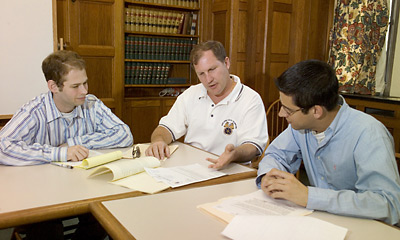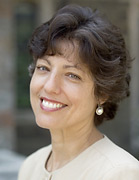Students put theory into practice in Cornell's first Labor Law Clinic
By Franklin Crawford

An area maintenance worker who was unjustly fired is back on the job thanks to the efforts of two Cornell Law School graduates who took on the case as students this past spring.
"This was one of the most rewarding and valuable experiences in law school for me," said Michael Berger. He and fellow student Harris Freier were assigned the "termination arbitration" case when they enrolled in Cornell's first-ever Labor Law Clinic, taught by Angela Cornell, associate clinical professor of law.
The clinic is the only one in the country where students learn substantive labor law and practice while representing labor clients in a closely supervised environment.

"This hands-on learning approach can't be duplicated in the typical classroom," said Cornell. "This course provides students the opportunity to work with real clients, and it advances skills and professional development emphasized by the American Bar Association as central to legal education."
Similar to student practice in the medical field, law-school clinics help students transition from the study of law to the practice of law. Students in Cornell's class work with union representatives and have to be prepared to appear before the National Labor Relations Board (NLRB), the Public Employment Relations Board and other administrative tribunals in the field of labor and employment law.
"Virtually all of the clinic students in the course are working with clients for the first time, interviewing, developing facts and counseling," said Cornell. "Last semester most students worked on domestic labor law issues from both the public and private sector."
Typical legal issues that students handled -- working closely with professors -- included: unfair labor practices; collective bargaining; contract interpretation; grievance and arbitration; and statutory employment issues. International labor law issues, though a small component of the course, were also addressed.
Berger and Freier's case: An employee had been terminated from his job over a timecard issue. Working on behalf of Teamsters Local 317, the students got involved at the arbitration stage of the dispute. Their task was to show that the employer did not have just cause for the action.
Berger and Freier worked all semester on the case, prepping for the arbitration, analyzing the company's collective bargaining agreement between the parties, then researching and writing the post-arbitration brief. They were responsible for the opening statements and cross-examinations, presenting evidence and arguing their case with the opposing attorney. They also dealt with any evidentiary issues that arose -- which meant they had to be ready for any surprises from the opposing counsel. In addition to the legal issues, the students had to develop the factual record, which involved tracking down other employees and interviewing potential witnesses.
The arbitrator's ruling, adopting the arguments made by Berger and Freier, arrived in July. The worker was reinstated in his job with no loss of seniority; however, no back pay was awarded. Berger and Freier, who graduated in May but were on campus in July studying for the bar exam, held a celebratory luncheon with Cornell and Bill Arnault, the union representative in the case.
"I was very impressed with the way they handled the case," said Arnault. "They clearly put a lot of time and effort into their work, and it showed."
As for surprises from the opposing counsel? There weren't any.
"They argued the case pretty much the way we wanted them to," said Freier.
Media Contact
Get Cornell news delivered right to your inbox.
Subscribe